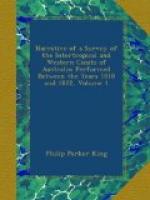February 16.
Our quitting this place being determined upon we did not lose any time; but from various delays of calm weather and adverse tides could not succeed in getting out to sea until the 18th.
It was impossible to go out by the dangerous channel through which we entered; but as Sunday Strait, through which the brig had been drifted before we went to Mauritius, appeared free from danger, we directed our course to it.
February 17.
And, after being underweigh all the night near its inner entrance, during which we had once nearly struck on a reef of rocks, found ourselves at daylight drifting through it with a rapid ebb-tide without a breath of wind. The tide however lasted long enough to carry us out, and when the flood commenced, which would have drifted us back again, a fresh breeze sprang up from the westward and very soon carried us clear of the influence of the tide.
With respect to the opening we had now left there were many conflicting opinions among us, but I have every reason to think that the land from Cape Leveque to Point Gantheaume is an island and that there is also a communication between Cygnet and Collier’s Bays, behind the islands of the Archipelago, where it is also probable there is an opening trending to the south-east. The great rise and fall of the tides in the neighbourhood of Point Gantheaume gives a plausibility to this opinion; and the only thing that I know against it is the trifling depth of the water between that point and Cape Villaret. This however may be caused by the numerous banks and channels existing there, and which, of themselves alone, are indicative of the opening being something more than a mere bay.
As sunset approached the eastern horizon was as usual in commotion; heavy dense clouds were collected, from which we had thunder and lightning. At seven o’clock the appearance was more threatening and, as a squall was evidently approaching, the sails were taken in and preparation made to meet it: soon after eight o’clock it passed rapidly over and brought a strong gust of wind, before which we were obliged to scud. After blowing most tempestuously for an hour the wind moderated, and the night passed without any repetition of it; we had however run five miles to leeward: had we been obliged to do this last night when underway in Cygnet Bay, or been drifted back this evening by the ebb-tide, we should have been very dangerously placed, from being surrounded by islands and blinded by the darkness of the night. Whilst this squall lasted the barometer was in no way affected, but the thermometer fell two degrees, having stood all the afternoon at 89 3/4 degrees.
February 18.




